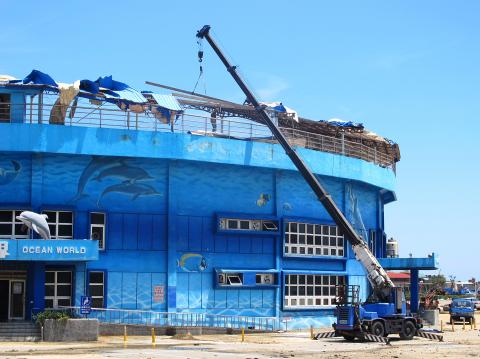Giant waves brought by Typhoon Soulik caused extensive damage to Yehliu Ocean World in Yehliu (野柳), New Taipei City (新北市), last weekend, killing more than 500 marine creatures housed in the park’s tanks.
The 23-year-old theme park, located on the northern coast, was hit in the early hours of Saturday by a surge of waves churned up by the storm.
“At about 3am, a huge wave slammed over the park’s seafront levee wall. The wave swept through the parking lot and broke through the glass doors of our front entrance,” park manager Liao Chun-wei (廖俊維) said. “It was like a tsunami. The churning water knocked down two security guards on duty, but luckily they were not seriously injured.”

Photo: Yu Chao-fu, Taipei Times
“It was a scary scene, like something out of a movie,” he added.
The security guards said they thought they were going to die.
They recalled hearing a loud bang when the wave broke the glass doors and looking up to see a half-meter high wave flooding in, sweeping them off their feet.
“The seawater kept advancing, pouring into our aquarium and into marine life cultivation tanks that are kept in the basement,” Liao said.
The tanks’ oxygenation system was shut down by the rushing seawater, starving more than 500 sea animals of oxygen, including fish, eagle rays, blacktip reef sharks, puffer fish, moray eels and snapping turtles, Liao said.
“Fortunately, the 11 dolphins and seven sea lions that are the stars of the park’s regular performances were unharmed,” Liao said.
“Other parts of the building were also damaged by the storm and some pieces of metal sheeting from the observation deck on top of the building were blown away,” he added.
Overall, Liao estimated the park incurred about NT$5 million (US$167,000) in damage.
“When a natural disaster strikes, we have no place to hide, no way to get away from it,” he said.
The park has been shut down indefinitely, pending clean-up efforts and restocking of marine animals.

US President Donald Trump said "it’s up to" Chinese President Xi Jinping (習近平) what China does on Taiwan, but that he would be "very unhappy" with a change in the "status quo," the New York Times said in an interview published yesterday. Xi "considers it to be a part of China, and that’s up to him what he’s going to be doing," Trump told the newspaper on Wednesday. "But I’ve expressed to him that I would be very unhappy if he did that, and I don’t think he’ll do that," he added. "I hope he doesn’t do that." Trump made the comments in

NOT AN OPENING: Trump’s violation of international law does not affect China’s consideration in attacking Taiwan; Beijing lacks capability, not precedent, an official said Taiwanese officials see the US’ capture of the president of Venezuela as a powerful deterrent to Beijing’s aggression and a timely reminder of the US’ ability to defeat militaries equipped with Chinese-made weapons. The strikes that toppled Venezuelan President Nicolas Maduro signaled to authoritarian leaders, including Chinese President Xi Jinping (習近平), US President Donald Trump’s willingness to use military might for international affairs core to US interests, one senior official in Taipei’s security circle said. That reassured Taiwan, the person said. Taipei has also dismissed the idea that Trump’s apparent violation of international law could embolden Beijing, said the official, who was not

A cold surge advisory was today issued for 18 cities and counties across Taiwan, with temperatures of below 10°C forecast during the day and into tonight, the Central Weather Administration (CWA) said. New Taipei City, Taipei, Taoyuan and Hsinchu, Miaoli and Yilan counties are expected to experience sustained temperatures of 10°C or lower, the CWA said. Temperatures are likely to temporarily drop below 10°C in most other areas, except Taitung, Pingtung, Penghu and Lienchiang (Matsu) counties, CWA data showed. The cold weather is being caused by a strong continental cold air mass, combined with radiative cooling, a process in which heat escapes from

Snow this morning fell on Alishan for the first time in seven years, as a strong continental cold air mass sent temperatures plunging across Taiwan, the Central Weather Administration (CWA) said. The Alishan weather station, located at an elevation of about 2,200m in central Taiwan, recorded snowfall from 8:55am to 9:15am, when the temperature dropped to about 1°C, the CWA said. With increased moisture and low temperatures in the high-altitude Alishan area, the conditions were favorable for snow, CWA forecaster Tsai Yi-chi (蔡伊其) said. The last time snow fell at the Alishan weather station was on Jan. 10, 2018, while graupel fell there